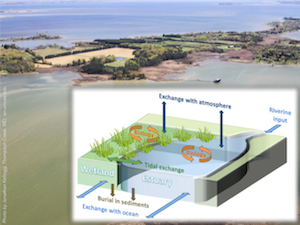Call for papers Carbon cycling in tidal wetlands and estuaries of the contiguous United States in an AGU cross-journal special collection
Despite the growing recognition of the importance of the coastal zone to the global carbon cycle, an understanding of carbon transport and transformations in large coastal regions is lacking. A special collection of manuscripts, focused on carbon cycling in tidal wetlands and estuaries of the contiguous United States (US), is being developed. Relevant manuscripts are sought that quantify major fluxes in the carbon cycle of US coastal waters, including riverine input, exchange with the atmosphere, primary production, respiration, burial, and lateral exchange between tidal wetlands, estuaries, and shelf waters. Of particular interest is how these fluxes respond to external perturbations, such as warming, sea-level rise, acidification, eutrophication, and human development of coastlines and coastal watersheds.
Articles can be submitted to any of three AGU journals in this unique cross-journal special collection:
- Global Biogeochemical Cycles—for papers on biogeochemical interactions that demonstrate fundamental implications for processes at regional or global scales
- Journal of Geophysical Research: Biogeosciences—for papers on biogeosciences of the Earth system in the past, present and future and the extension of this research to planetary studies
- Journal of Geophysical Research: Oceans—for papers on the physics, chemistry, biology and geology of the oceans and their interaction with other components of the Earth system
Papers should be submitted directly to these journals and this special collection should be selected on the submission form. Papers may be submitted until February 1, 2019. Papers will be published online once they are accepted. Questions should be directed to the guest editors for the special collection: Raymond Najjar (rgn1@psu.edu), Rusty Feagin (feaginr@tamu.edu), Jose D. Fuentes (jdfuentes@psu.edu), and Kevin Kroeger (kkroeger@usgs.gov).
See related upcoming OCB Workshop:
Lateral carbon flux in tidal wetlands: Filling a key knowledge gap through a methods intercomparison and data synthesis (August 21-23, 2018, Woods Hole, MA





